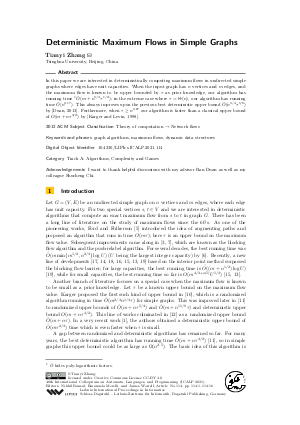Deterministic Maximum Flows in Simple Graphs
Author Tianyi Zhang
-
Part of:
Volume:
48th International Colloquium on Automata, Languages, and Programming (ICALP 2021)
Part of: Series: Leibniz International Proceedings in Informatics (LIPIcs)
Part of: Conference: International Colloquium on Automata, Languages, and Programming (ICALP) - License:
 Creative Commons Attribution 4.0 International license
Creative Commons Attribution 4.0 International license
- Publication Date: 2021-07-02
File

PDF
LIPIcs.ICALP.2021.114.pdf
- Filesize: 0.73 MB
- 16 pages
Document Identifiers
Subject Classification
ACM Subject Classification
- Theory of computation → Network flows
Keywords
- graph algorithms
- maximum flows
- dynamic data structures
Metrics
- Access Statistics
-
Total Accesses (updated on a weekly basis)
0Document
0Metadata
Abstract
In this paper we are interested in deterministically computing maximum flows in undirected simple graphs where edges have unit capacities. When the input graph has n vertices and m edges, and the maximum flow is known to be upper bounded by τ as prior knowledge, our algorithm has running time Õ(m + n^{5/3}τ^{1/2}); in the extreme case where τ = Θ(n), our algorithm has running time Õ(n^{2.17}). This always improves upon the previous best deterministic upper bound Õ(n^{9/4}τ^{1/8}) by [Duan, 2013]. Furthermore, when τ ≥ n^{0.67} our algorithm is faster than a classical upper bound of O(m + nτ^{3/2}) by [Karger and Levin, 1998].
Cite As Get BibTex
Tianyi Zhang. Deterministic Maximum Flows in Simple Graphs. In 48th International Colloquium on Automata, Languages, and Programming (ICALP 2021). Leibniz International Proceedings in Informatics (LIPIcs), Volume 198, pp. 114:1-114:16, Schloss Dagstuhl – Leibniz-Zentrum für Informatik (2021)
https://doi.org/10.4230/LIPIcs.ICALP.2021.114
BibTex
@InProceedings{zhang:LIPIcs.ICALP.2021.114,
author = {Zhang, Tianyi},
title = {{Deterministic Maximum Flows in Simple Graphs}},
booktitle = {48th International Colloquium on Automata, Languages, and Programming (ICALP 2021)},
pages = {114:1--114:16},
series = {Leibniz International Proceedings in Informatics (LIPIcs)},
ISBN = {978-3-95977-195-5},
ISSN = {1868-8969},
year = {2021},
volume = {198},
editor = {Bansal, Nikhil and Merelli, Emanuela and Worrell, James},
publisher = {Schloss Dagstuhl -- Leibniz-Zentrum f{\"u}r Informatik},
address = {Dagstuhl, Germany},
URL = {https://drops.dagstuhl.de/entities/document/10.4230/LIPIcs.ICALP.2021.114},
URN = {urn:nbn:de:0030-drops-141832},
doi = {10.4230/LIPIcs.ICALP.2021.114},
annote = {Keywords: graph algorithms, maximum flows, dynamic data structures}
}
Author Details
Acknowledgements
I want to thank helpful discussions with my advisor Ran Duan as well as my colleague Shucheng Chi.
References
-
Julia Chuzhoy, Yu Gao, Jason Li, Danupon Nanongkai, Richard Peng, and Thatchaphol Saranurak. A deterministic algorithm for balanced cut with applications to dynamic connectivity, flows, and beyond. In 2020 IEEE 61st Annual Symposium on Foundations of Computer Science (FOCS), pages 1158-1167. IEEE, 2020.

-
Julia Chuzhoy and Thatchaphol Saranurak. Deterministic algorithms for decremental shortest paths via layered core decomposition. In Proceedings of the 2021 ACM-SIAM Symposium on Discrete Algorithms (SODA), pages 2478-2496. SIAM, 2021.

-
Efim A Dinic. Algorithm for solution of a problem of maximum flow in networks with power estimation. In Soviet Math. Doklady, volume 11, pages 1277-1280, 1970.

-
Ran Duan. Breaking the 𝒪(n^2.5) deterministic time barrier for undirected unit-capacity maximum flow. In Proceedings of the twenty-fourth annual ACM-SIAM Symposium on Discrete Algorithms, pages 1171-1179. SIAM, 2013.

-
Lester Randolph Ford Jr and Delbert Ray Fulkerson. Flows in networks. Princeton university press, 2015.

-
Andrew V Goldberg and Satish Rao. Beyond the flow decomposition barrier. Journal of the ACM (JACM), 45(5):783-797, 1998.

-
Andrew V Goldberg and Robert E Tarjan. A new approach to the maximum-flow problem. Journal of the ACM (JACM), 35(4):921-940, 1988.

-
Jacob Holm, Kristian De Lichtenberg, and Mikkel Thorup. Poly-logarithmic deterministic fully-dynamic algorithms for connectivity, minimum spanning tree, 2-edge, and biconnectivity. Journal of the ACM (JACM), 48(4):723-760, 2001.

-
Jacob Holm, Eva Rotenberg, and Christian Wulff-Nilsen. Faster fully-dynamic minimum spanning forest. In Algorithms-ESA 2015, pages 742-753. Springer, 2015.

-
David R Karger. Using random sampling to find maximum flows in uncapacitated undirected graphs. In Proceedings of the twenty-ninth annual ACM symposium on Theory of computing, pages 240-249, 1997.

-
David R Karger and Matthew S Levine. Finding maximum flows in undirected graphs seems easier than bipartite matching. In Proceedings of the thirtieth annual ACM symposium on Theory of computing, pages 69-78, 1998.

-
David R Karger and Matthew S Levine. Random sampling in residual graphs. In Proceedings of the thiry-fourth annual ACM symposium on Theory of computing, pages 63-66, 2002.

- Tarun Kathuria. A potential reduction inspired algorithm for exact max flow in almost Õ(m^4/3) time. arXiv preprint, 2020. URL: http://arxiv.org/abs/2009.03260.
-
Yin Tat Lee and Aaron Sidford. Path finding methods for linear programming: Solving linear programs in Õ(√rank) iterations and faster algorithms for maximum flow. In 2014 IEEE 55th Annual Symposium on Foundations of Computer Science, pages 424-433. IEEE, 2014.

- Yang P Liu and Aaron Sidford. Faster divergence maximization for faster maximum flow. arXiv preprint, 2020. URL: http://arxiv.org/abs/2003.08929.
-
Yang P Liu and Aaron Sidford. Faster energy maximization for faster maximum flow. In Proceedings of the 52nd Annual ACM SIGACT Symposium on Theory of Computing, pages 803-814, 2020.

-
Aleksander Madry. Navigating central path with electrical flows: From flows to matchings, and back. In 2013 IEEE 54th Annual Symposium on Foundations of Computer Science, pages 253-262. IEEE, 2013.

-
Aleksander Madry. Computing maximum flow with augmenting electrical flows. In 2016 IEEE 57th Annual Symposium on Foundations of Computer Science (FOCS), pages 593-602. IEEE, 2016.

- Jan van den Brand, Yin Tat Lee, Yang P Liu, Thatchaphol Saranurak, Aaron Sidford, Zhao Song, and Di Wang. Minimum cost flows, mdps, and ell_1-regression in nearly linear time for dense instances. arXiv e-prints, 2021. URL: http://arxiv.org/abs/2101.05719.
